Mackenzie River: Difference between revisions
imported>George Swan (more details) |
imported>George Swan (trim) |
||
| Line 34: | Line 34: | ||
| accessdate = 2020-12-11 | | accessdate = 2020-12-11 | ||
| url-status = live | | url-status = live | ||
| quote = | | quote = | ||
}} | }} | ||
</ref> | </ref> | ||
}} | }} | ||
Latest revision as of 21:20, 4 March 2021
The Mackenzie River is the river with the second largest drainage basin in North America.[1] The Mackenzie and its tributaries drain 1,805,200 square kilometers. Its mean discharge is 9,700 cubic metres per second. It is 4,241 long.
The river flows North, emptying into the Beaufort Sea, in the Arctic Ocean. The main river is navigable to barge traffic from its source, Great Slave Lake, after the ice melts. During winter the ice on the river freezes deeply enough to support large cargo trucks.
There is an intermodal terminal at Hay River, Northwest Territories. Hay River is the northernmost terminus of the North American railway grid. A fleet of tugs based in Hay River serves communities on the river and its tributaries, and many communities and resource development projects in the Arctic Ocean.
Major tributaries include the Slave River, Bear River and Liard River.[2]
References
- ↑ Rivers Flowing Into the Arctic Ocean. Atlas of Canada. Retrieved on 2008-11-03.
- ↑ Tracy Teves. The Peace River: Highway of the North, Highway of the North Exhibit at the North Peace Museum, 2019-10-11. Retrieved on 2020-12-11.
